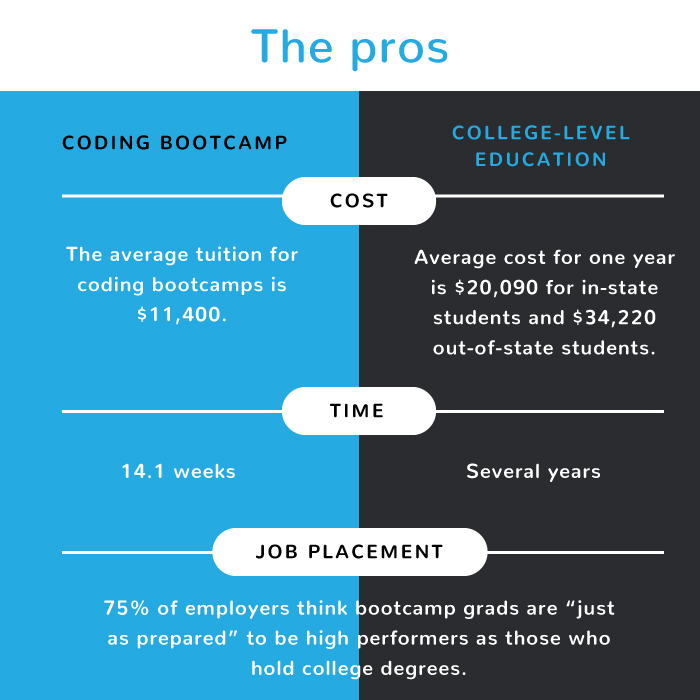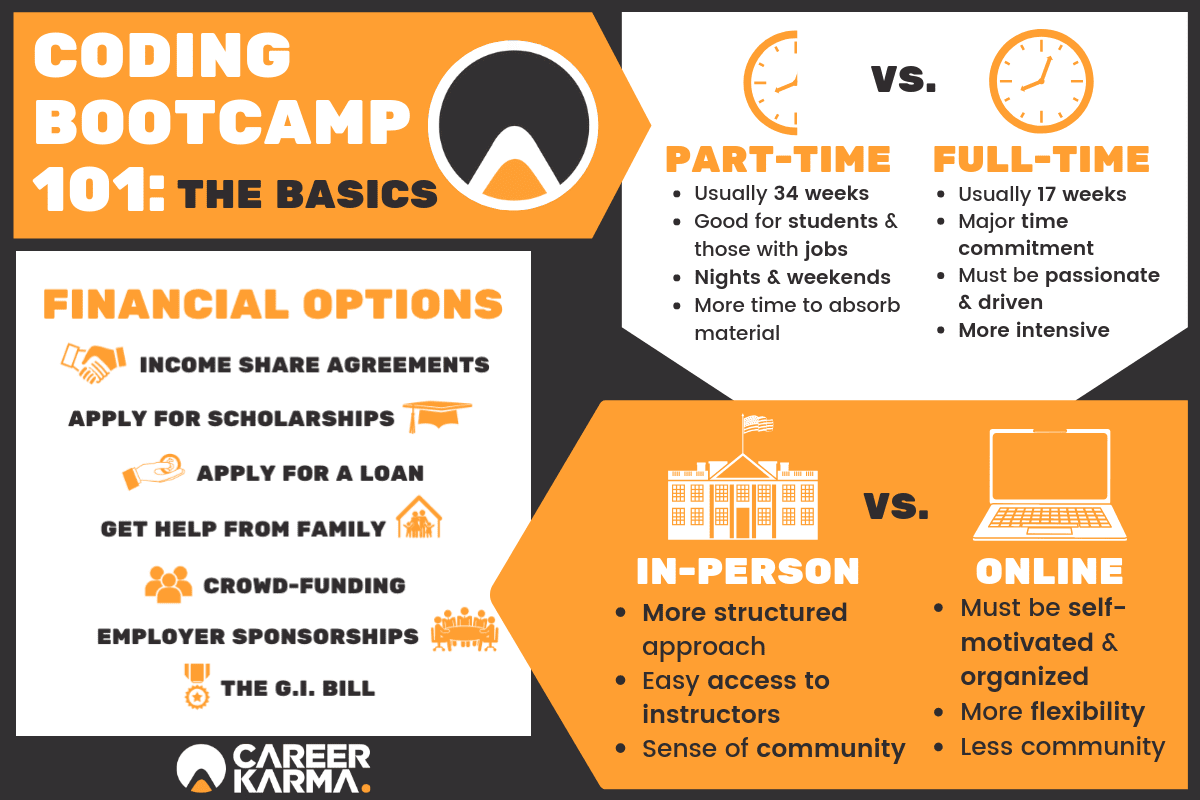Job Market Demand for Bootcamp Graduates
The success of coding bootcamp graduates in securing employment is a complex issue, influenced by factors like program quality, individual skills, and prevailing market conditions. While bootcamps offer a faster and more focused pathway to tech careers than traditional computer science degrees, understanding the nuances of job market demand is crucial for prospective students. This section will examine the job placement rates of bootcamp graduates compared to traditional CS graduates, identify in-demand skills, and explore geographic variations in job opportunities.
Bootcamp Graduate Placement Rates Compared to Traditional Computer Science Graduates
Direct comparison of placement rates between bootcamp and traditional CS graduates is challenging due to inconsistent data collection methods and varying definitions of “successful placement.” However, anecdotal evidence and reports from reputable sources suggest that bootcamp graduates often experience high placement rates, particularly within specific niches like web development. The speed and focused nature of bootcamp curricula allow graduates to enter the job market quickly, often filling immediate needs for junior-level developers. Traditional CS graduates, while possessing a broader theoretical foundation, may face a longer job search due to the competitive nature of the field and the expectation of more extensive experience. The table below provides estimated placement rates, acknowledging the limitations of available data. These figures should be considered approximate and vary based on numerous factors.
| Bootcamp Type | Experience Level | Estimated Placement Rate (%) | Notes |
|---|---|---|---|
| Web Development | Entry-Level | 70-85 | High demand for front-end and back-end developers. |
| Data Science | Entry-Level | 60-75 | Requires strong statistical and programming skills. |
| Cybersecurity | Entry-Level | 65-80 | Growing demand due to increasing cybersecurity threats. |
| Full-Stack Development | Junior | 75-90 | Often higher placement rates due to broader skillset. |
In-Demand Programming Languages and Technologies for Entry-Level Roles
Bootcamps generally focus on equipping students with practical skills in high-demand programming languages and technologies relevant to entry-level roles. The specific technologies emphasized vary depending on the bootcamp’s specialization. For example, web development bootcamps often prioritize JavaScript, React, Node.js, Python, and SQL. Data science bootcamps, on the other hand, might focus on Python, R, SQL, and various data visualization libraries. The effectiveness of bootcamp preparation depends on the curriculum’s alignment with current industry trends and the quality of instruction. A well-structured bootcamp provides students with the foundational knowledge and practical experience needed to perform entry-level tasks. Many bootcamps also incorporate portfolio projects that showcase students’ skills to potential employers.
Geographic Variations in Job Market Demand for Bootcamp Graduates
The demand for bootcamp graduates varies significantly across geographical regions. Tech hubs like San Francisco, Seattle, New York City, Austin, and Boston consistently exhibit high demand due to the concentration of tech companies and startups. These areas offer a greater number of job opportunities and often higher salaries. Conversely, regions with less developed tech sectors may have lower demand for bootcamp graduates, although this is gradually changing as technology adoption increases in various industries and locations. For instance, while Silicon Valley remains a powerhouse, cities like Denver, Atlanta, and Raleigh-Durham are experiencing rapid growth in their tech sectors, creating more opportunities for bootcamp graduates.
Bootcamp Curriculum Effectiveness

Coding bootcamps offer a fast-paced alternative to traditional computer science degrees, promising job readiness in a fraction of the time. However, their effectiveness in preparing graduates for the demands of the modern tech industry is a subject of ongoing debate. This section will analyze the strengths and weaknesses of typical bootcamp curricula compared to university programs, highlighting skill gaps and suggesting improvements.
Is a coding bootcamp enough to get a job – Bootcamps and university computer science programs differ significantly in their approach to education, leading to distinct advantages and disadvantages for graduates entering the job market.
Comparison of Bootcamp and University Curricula
The following points compare and contrast the typical curriculum of a coding bootcamp with that of a university computer science program. These differences directly impact the skills and knowledge base of graduates.
- Focus and Depth: Bootcamps prioritize practical skills and rapid deployment of projects, often covering a narrower range of topics at a shallower depth. University programs offer a broader, more theoretical foundation, exploring computer science principles in greater detail, including algorithms, data structures, and theoretical computer science.
- Project-Based Learning: Bootcamps heavily emphasize hands-on projects, allowing students to build a portfolio of demonstrable skills. University programs also include projects, but often incorporate more theoretical assignments and exams.
- Pace and Intensity: Bootcamps are intensive, fast-paced programs designed for rapid skill acquisition. University programs are typically spread over several years, allowing for a more gradual learning curve.
- Networking and Career Services: Many bootcamps provide career services, including resume review, interview preparation, and networking opportunities. Universities also offer career services, but these may be less focused on immediate job placement.
- Cost and Time Commitment: Bootcamps are generally more affordable and shorter than university programs, making them a more accessible option for many.
Skill and Knowledge Gaps of Bootcamp Graduates
While bootcamps excel at imparting practical skills, certain knowledge gaps may exist compared to university graduates. Understanding these gaps is crucial for both bootcamp graduates and employers.
- Theoretical Computer Science: Bootcamp graduates may lack a deep understanding of fundamental computer science concepts such as algorithms, data structures, and complexity theory. This can limit their ability to solve complex problems efficiently and design scalable systems.
- Software Engineering Principles: Bootcamps often focus on specific technologies, potentially neglecting broader software engineering principles like design patterns, testing methodologies (beyond basic unit testing), version control best practices (beyond the basics of Git), and software architecture. This can hinder their ability to contribute effectively to large-scale projects.
- System Design: University programs often incorporate coursework on system design and architecture, allowing graduates to understand how different components of a system interact and scale. Bootcamps may not cover this in as much detail.
- Databases: While bootcamps teach database technologies, the depth of coverage may be less extensive than in a university setting, potentially lacking in advanced database design and optimization techniques.
Hypothetical Bootcamp Curriculum Addressing Employer Concerns, Is a coding bootcamp enough to get a job
To address common employer concerns, a well-designed bootcamp curriculum should incorporate elements often found in university programs while maintaining its focus on practical skills and rapid job readiness.
This hypothetical curriculum incorporates elements that bridge the gap between bootcamp and university education, offering a more robust foundation for graduates.
- Foundational Computer Science: Introduction to algorithms and data structures, focusing on practical application rather than rigorous mathematical proofs. This would include hands-on exercises and projects using common data structures and algorithms.
- Software Engineering Practices: Comprehensive coverage of software engineering principles including design patterns, testing methodologies (unit, integration, and system testing), version control (Git branching strategies, code reviews), and agile development methodologies. This would involve collaborative project work emphasizing best practices.
- System Design Fundamentals: Introduction to system design concepts, including scalability, reliability, and security. This could include case studies and design exercises for various system types (e.g., web applications, APIs).
- Advanced Database Techniques: Beyond basic CRUD operations, the curriculum would delve into database design principles, normalization, query optimization, and potentially NoSQL databases.
- Specialized Tracks: Offering specialized tracks (e.g., web development, data science, mobile development) to cater to specific job market demands, ensuring graduates possess in-demand skills.
- Robust Career Services: Continued focus on career services, including portfolio building, mock interviews, and networking opportunities with industry professionals.
The Role of Networking and Portfolio: Is A Coding Bootcamp Enough To Get A Job

Successfully transitioning from a coding bootcamp to a software development role hinges significantly on two key areas: building a robust professional network and crafting a compelling portfolio that showcases your newly acquired skills. These are not mutually exclusive; in fact, a strong network can significantly enhance your portfolio’s visibility and impact, and a strong portfolio opens doors to networking opportunities.
Networking and portfolio development are interwoven processes that should ideally begin during your bootcamp and continue throughout your job search. A proactive approach to both will dramatically increase your chances of landing your desired position.
Strategies for Building a Professional Network During a Coding Bootcamp
Effective networking starts with active participation within the bootcamp environment. This includes engaging with instructors, forming study groups with peers, and attending workshops or guest speaker events. Beyond the bootcamp, leverage online platforms like LinkedIn to connect with alumni, instructors, and professionals in your target field. Attend industry meetups and conferences, even virtually, to expand your connections and learn about current trends. Don’t hesitate to reach out to professionals for informational interviews; a brief conversation can provide valuable insights and potentially lead to future opportunities. Remember, networking is about building genuine relationships, not just collecting contacts.
The Importance of a Well-Designed Portfolio for Showcasing Skills
Your portfolio serves as a tangible demonstration of your coding abilities. It should be more than just a collection of projects; it’s a curated showcase of your best work, highlighting your problem-solving skills, technical proficiency, and creativity. Potential employers will use your portfolio to assess your coding style, understanding of best practices, and ability to bring projects to completion. A well-structured portfolio, easily navigable and visually appealing, significantly improves your chances of securing an interview.
Examples of Strong Portfolio Projects
A strong portfolio project demonstrates a complete understanding of the software development lifecycle. For example, a full-stack application showcasing user authentication, a robust backend, and a clean, user-friendly front-end interface would be highly impressive. Another effective example would be a contribution to an open-source project, demonstrating your ability to collaborate effectively within a team and contribute to a larger codebase. A data visualization project using a library like D3.js, showcasing your ability to work with data and present information effectively, could also be very impactful. The key is to choose projects that demonstrate a variety of skills and showcase your best work. Each project should be accompanied by a clear description outlining the problem, your solution, the technologies used, and the challenges overcome.
Tailoring a Resume and Cover Letter to Highlight Bootcamp Experiences
Your resume and cover letter should be meticulously crafted to emphasize your bootcamp experience and project accomplishments. Quantify your achievements whenever possible – for example, instead of saying “Improved website performance,” say “Improved website load time by 20% through code optimization.” Highlight any projects that directly address the needs or technologies mentioned in the job description. Your cover letter should briefly introduce yourself and your passion for software development, and then directly connect your bootcamp projects and skills to the specific requirements of the role. It’s crucial to tailor both your resume and cover letter to each job application, highlighting the most relevant skills and experiences for that particular position.
The Importance of Self-Learning and Continued Development

A coding bootcamp provides a concentrated burst of knowledge and skills, but it’s merely the starting point of a lifelong learning journey in the ever-evolving tech landscape. Continuous self-learning and skill development are crucial for staying competitive, adapting to new technologies, and advancing your career. The skills learned in a bootcamp form a strong foundation, but consistent effort beyond the structured curriculum is essential for long-term success.
The rapid pace of technological advancement necessitates a proactive approach to learning. New frameworks, libraries, and programming paradigms emerge constantly, requiring developers to continually update their skillset to remain relevant and in-demand. This isn’t simply about keeping up; it’s about actively seeking out new challenges and expanding your capabilities to unlock greater career opportunities and increase your earning potential.
Resources and Strategies for Continuous Learning
Maintaining and enhancing your technical abilities requires a multi-faceted approach. Leveraging a variety of resources ensures you gain a well-rounded understanding and cater to different learning styles. Effective strategies include dedicating specific time each week to learning, focusing on areas of weakness, and actively participating in the developer community.
- Online Courses: Platforms like Coursera, edX, Udemy, and Udacity offer a vast selection of courses on various programming languages, frameworks, and technologies. These courses often include interactive exercises, quizzes, and projects to reinforce learning.
- Interactive Coding Platforms: Websites such as Codewars, HackerRank, and LeetCode provide coding challenges and puzzles that help sharpen your problem-solving skills and expose you to different coding styles.
- Documentation and Official Tutorials: Familiarizing yourself with the official documentation of programming languages, frameworks, and libraries is crucial. These resources provide the most accurate and up-to-date information.
- Books and Articles: Many excellent books and articles are available on various aspects of software development. Reading these resources can provide a deeper understanding of core concepts and best practices.
- Open Source Projects: Contributing to open-source projects is an excellent way to learn from experienced developers, improve your coding skills, and build your portfolio.
A Plan for Maintaining and Expanding Technical Skills
A structured plan ensures consistent progress and prevents skill degradation. This plan should incorporate diverse learning methods and be tailored to individual career goals. Regular review and adjustment are crucial to stay aligned with evolving industry trends.
- Weekly Dedicated Learning Time: Allocate at least 5-10 hours per week for focused learning and skill development. This time can be divided into smaller, manageable sessions.
- Targeted Skill Improvement: Identify specific areas where improvement is needed, based on job requirements and personal goals. Focus learning efforts on these areas.
- Project-Based Learning: Undertake personal projects to apply newly acquired skills and build a strong portfolio. This could involve building web applications, mobile apps, or contributing to open-source projects.
- Community Engagement: Participate in online forums, attend meetups, and connect with other developers to share knowledge and learn from their experiences.
- Regular Skill Audits: Periodically assess your skills and knowledge to identify gaps and plan future learning activities.
Challenges of Transitioning from Bootcamp to Professional Work and Solutions
The shift from the structured environment of a bootcamp to the demands of a professional setting can present several challenges. Understanding these challenges and having proactive solutions in place is essential for a smooth transition.
- Increased Complexity and Responsibility: Professional projects are often significantly larger and more complex than bootcamp projects. Solution: Start with smaller, manageable tasks and gradually increase the complexity of your work. Seek mentorship from experienced colleagues.
- Working in Teams: Collaboration is a crucial aspect of professional software development. Solution: Actively participate in team discussions, contribute to code reviews, and learn from the experience of your colleagues. Practice effective communication skills.
- Time Management and Deadlines: Meeting deadlines and managing time effectively are crucial in professional settings. Solution: Break down large tasks into smaller, manageable components. Use project management tools and techniques to stay organized and track progress.
- Dealing with Ambiguity and Unstructured Problems: Professional projects often lack the clear structure of bootcamp assignments. Solution: Develop problem-solving skills, learn to break down complex problems into smaller, solvable parts, and seek clarification when needed.
- Adapting to Company Culture and Processes: Each company has its own unique culture and work processes. Solution: Observe and learn from experienced colleagues. Ask questions and seek clarification when unsure about company policies and procedures.
Alternative Paths to Employment
Securing a developer role after a coding bootcamp, or even with a traditional computer science degree, requires a multifaceted approach. The job search process, while sharing some similarities, differs significantly depending on the educational background and skillset acquired. Understanding these differences and exploring alternative routes can significantly increase the chances of landing a desirable position.
Bootcamp graduates often leverage their intensive, project-focused curriculum to showcase practical skills, emphasizing demonstrable abilities over theoretical knowledge. Graduates with traditional degrees, on the other hand, may rely more on academic achievements and broader theoretical understanding, often needing to translate that knowledge into practical applications for prospective employers. Both groups benefit from a strong portfolio and effective networking strategies.
Comparing Job Search Processes
Bootcamp graduates frequently focus their job search on entry-level developer roles that directly utilize the skills acquired during their intensive training. Their resumes often highlight recent projects and demonstrable skills, aiming to quickly prove their capability. Conversely, those with traditional degrees might explore a broader range of roles, potentially leveraging internships or prior experience to demonstrate their readiness for more senior positions. Both groups will use similar resources, but the emphasis and approach may differ. For example, a bootcamp graduate might highlight a recent portfolio project demonstrating proficiency in a specific framework, while a degree holder might highlight a research project or a relevant thesis.
Internships and Freelance Work as Stepping Stones
Internships offer invaluable practical experience and networking opportunities, bridging the gap between education and full-time employment. They provide a chance to apply learned skills in a real-world setting, receive mentorship, and build a professional network within a specific company or industry. The drawback is that internships are often unpaid or low-paying, requiring careful financial planning.
Freelance work offers flexibility and allows developers to build a portfolio while gaining experience in various projects and technologies. It can be a great way to build a reputation and demonstrate skills to potential employers. However, freelance work often lacks the structure and benefits of full-time employment, including consistent income and employer-sponsored benefits. Finding consistent freelance work can also be challenging, requiring proactive self-promotion and client acquisition.
Resources for Finding Entry-Level Developer Roles
Finding entry-level developer roles requires a proactive and multi-faceted approach. Leveraging various resources significantly increases the chances of success.
- Online Job Boards: Indeed, LinkedIn, Glassdoor, GitHub Jobs, Stack Overflow Jobs offer a wide array of listings for entry-level developer positions. These platforms often allow for customized search filters based on location, technology, and experience level.
- Company Websites: Many companies post job openings directly on their websites. Checking the careers pages of companies of interest can be a highly effective strategy.
- Networking Events: Attending industry conferences, meetups, and hackathons provides opportunities to connect with potential employers and learn about unadvertised job openings. These events also offer a chance to showcase skills and build relationships within the developer community.
- Professional Networking Platforms: LinkedIn remains a powerful tool for connecting with professionals in the tech industry. Building a strong profile and actively engaging with industry professionals can lead to valuable networking opportunities and potential job leads.
- Recruitment Agencies: Specialized tech recruitment agencies can assist in finding suitable job opportunities and provide guidance throughout the job search process.


Tim Redaksi